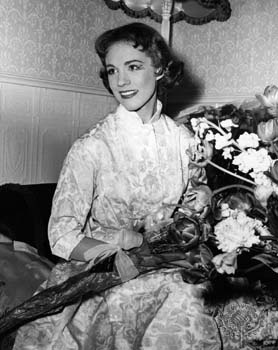Andrews, Dame Julie
British actress and singer
original name Julia Elizabeth Wells
born Oct. 1, 1935, Walton-on-Thames, Surrey, Eng.
English motion-picture, stage, and musical star noted for her crystalline, four-octave voice and her charm and skill as an actress.
At the age of 10, Andrews began singing with her pianist mother and singer stepfather (whose last name she legally adopted) in their music-hall act. Demonstrating a remarkably powerful voice with perfect pitch, she made her solo professional debut in 1947 singing an operatic aria in Starlight Roof, a revue staged at the London hippodrome.

 Andrews made her Broadway debut in 1954 in the American production of the popular British musical spoof The Boy Friend. In 1956 she created the role of the Cockney flower girl Eliza Doolittle in Alan Jay Lerner (Lerner, Alan Jay) and Frederick Loewe (Loewe, Frederick)'s classic musical My Fair Lady. Andrews's performance was universally acclaimed, and the production became one of the biggest hits in Broadway history, as well as a huge success in Britain. In 1957, during the show's run, Andrews appeared on American television in a musical version of Cinderella, written for her by Richard Rodgers (Rodgers, Richard) and Oscar Hammerstein II (Hammerstein, Oscar, II). In 1960 she had another hit in a role developed especially for her, that of Queen Guinevere in Lerner and Loewe's Camelot.
Andrews made her Broadway debut in 1954 in the American production of the popular British musical spoof The Boy Friend. In 1956 she created the role of the Cockney flower girl Eliza Doolittle in Alan Jay Lerner (Lerner, Alan Jay) and Frederick Loewe (Loewe, Frederick)'s classic musical My Fair Lady. Andrews's performance was universally acclaimed, and the production became one of the biggest hits in Broadway history, as well as a huge success in Britain. In 1957, during the show's run, Andrews appeared on American television in a musical version of Cinderella, written for her by Richard Rodgers (Rodgers, Richard) and Oscar Hammerstein II (Hammerstein, Oscar, II). In 1960 she had another hit in a role developed especially for her, that of Queen Guinevere in Lerner and Loewe's Camelot.Although Andrews lost the part of Eliza in the film version of My Fair Lady (1964), she did make her movie debut that year. After seeing her performance in Camelot, Walt Disney (Disney, Walt) went backstage and offered Andrews the title role of the proper, magical English nanny in his Mary Poppins (1964). The picture became one of Disney's biggest moneymakers, and Andrews won an Academy Award; the wholesome role and image, however, would prove difficult for Andrews to shed. Her portrayal of the governess and aspiring nun Maria in The Sound of Music (1965), one of the top-grossing films of all time, earned Andrews another Academy Award nomination and further reinforced her sweet, “goody-goody” image.
Andrews attempted to change that image with dramatic, nonmusical roles in such films as The Americanization of Emily (1964) and Alfred Hitchcock (Hitchcock, Sir Alfred)'s Torn Curtain (1966), but these were overshadowed by her musicals, whose success made her one of the biggest stars of the decade. By the late 1960s, however, traditional film musicals were declining in popularity. Andrews starred in two expensive musical flops—Star! (1968) and Darling Lili (1970), the latter produced, directed, and cowritten by Blake Edwards, whom she married in 1970—and was considered by many to be a has-been. She continued to make television and concert appearances, and, using the name Julie Edwards, she wrote two children's books—Mandy (1971) and The Last of the Really Great Whangdoodles (1974). She did not, however, have another notable film role until 1979, when she played a supporting part in Edwards's popular comedy 10 (1979). Beginning with that picture, audiences began to accept Andrews in a wider range of roles. She proved herself a versatile actress, adept at both comedy and drama, and she received an Academy Award nomination for her performance as a woman impersonating a male female-impersonator in Edwards's Victor/Victoria (1982). She was also widely praised for her portrayal of a violinist struggling with multiple sclerosis in Duet for One (1986).
Andrews reprised her Victor/Victoria role on Broadway in 1995 and stirred up controversy when she refused to accept a Tony nomination for her performance—the only nomination the show received—because she felt that the rest of the cast and crew, which included director Edwards, had been “egregiously overlooked.” In 1997 Andrews was inducted into the Theater Hall of Fame. She was made Dame Commander of the Order of the British Empire (DBE) in 2000. Her autobiography, Home: A Memoir of My Early Years, was published in 2008.
Additional Reading
Robert Windeler, Julie Andrews: A Life on Stage and Screen (1997); James Arntz and Thomas S. Wilson, Julie Andrews (1995); Les Spindle, Julie Andrews: A Bio-Bibliography (1989).